

Discernment. Discernment is the activity of determining the value and quality of a certain subject or event, particularly the activity of going past the mere perception of something and making detailed judgments about that thing. As a virtue, a discerning individual is considered to possess wisdom, and be of good judgement; especially so with regard to subject matter often overlooked by others. Wisdom. The ability to think and act using knowledge, experience, understanding, common sense and insight Wisdom Defending Youth Against Love by Meynier, c. 1810.
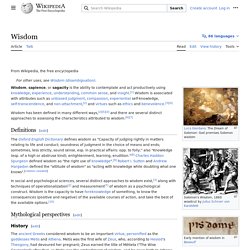
Reality. Not to be confused with Realty.
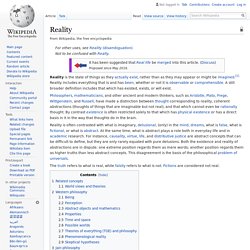
Humanism. In modern times, humanist movements are typically aligned with secularism, and today "Humanism" typically refers to a non-theistic life stance centred on human agency, and looking to science instead of religious dogma in order to understand the world.[2] Background The word "Humanism" is ultimately derived from the Latin concept humanitas, and, like most other words ending in -ism, entered English in the nineteenth century.
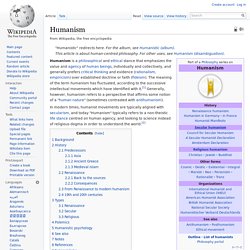
However, historians agree that the concept predates the label invented to describe it, encompassing the various meanings ascribed to humanitas, which included both benevolence toward one's fellow humans and the values imparted by bonae litterae or humane learning (literally "good letters"). In the second century A.D, a Latin grammarian, Aulus Gellius (c. 125– c. 180), complained: Gellius says that in his day humanitas is commonly used as a synonym for philanthropy – or kindness and benevolence toward one's fellow human being.
History Predecessors Asia Ancient Greece Types. Symbiosis. In a symbiotic mutualistic relationship, the clownfish feeds on small invertebrates that otherwise have potential to harm the sea anemone, and the fecal matter from the clownfish provides nutrients to the sea anemone.
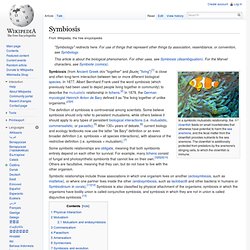
The clownfish is additionally protected from predators by the anemone's stinging cells, to which the clownfish is immune. Symbiosis (from Ancient Greek σύν "together" and βίωσις "living")[1] is close and often long-term interaction between two or more different biological species. In 1877, Albert Bernhard Frank used the word symbiosis (which previously had been used to depict people living together in community) to describe the mutualistic relationship in lichens.[2] In 1879, the German mycologist Heinrich Anton de Bary defined it as "the living together of unlike organisms. "[3][4] Some symbiotic relationships are obligate, meaning that both symbionts entirely depend on each other for survival.
Physical interaction[edit] Alder tree root nodule. Integral (spirituality) Integral thought is claimed to provide "a new understanding of how evolution affects the development of consciousness and culture.

"[3] It includes areas such as business, education, medicine, spirituality, sports,[14] psychology and psychotherapy.[15] The idea of the evolution of consciousness has also become a central theme in much of integral theory.[16] According to the Integral Transformative Practice website, integral means "dealing with the body, mind, heart, and soul. "[17] Noosphere. Monism. Monism is the philosophical view that a variety of existing things can be explained in terms of a single reality or substance.
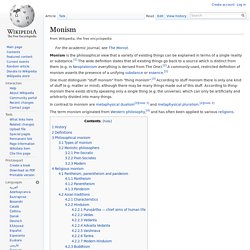
The wide definition states that all existing things go back to a source which is distinct from them (e.g. in Neoplatonism everything is derived from The One). A commonly-used, restricted definition of monism asserts the presence of a unifying substance or essence. One must distinguish "stuff monism" from "thing monism".[3] According to stuff monism there is only one kind of stuff (e.g. matter or mind), although there may be many things made out of this stuff. According to thing-monism there exists strictly speaking only a single thing (e.g. the universe), which can only be artificially and arbitrarily divided into many things.
The term monism originated from Western philosophy,[4] and has often been applied to various religions. History[edit] It was later also applied to the theory of absolute identity set forth by Hegel and Schelling. Definitions[edit] a. B. Holism. For the suffix, see holism.

Holism (from Greek ὅλος holos "all, whole, entire") is the idea that natural systems (physical, biological, chemical, social, economic, mental, linguistic, etc.) and their properties should be viewed as wholes, not as collections of parts. This often includes the view that systems function as wholes and that their functioning cannot be fully understood solely in terms of their component parts.[1][2] Reductionism may be viewed as the complement of holism. Reductionism analyzes a complex system by subdividing or reduction to more fundamental parts. For example, the processes of biology are reducible to chemistry and the laws of chemistry are explained by physics. Social scientist and physician Nicholas A. History[edit] The idea has ancient roots. The concept of holism played a pivotal role in Baruch Spinoza's philosophy[8][9] and more recently in that of Hegel[10][11] and Edmund Husserl.[12][13] In science[edit] General scientific status[edit]